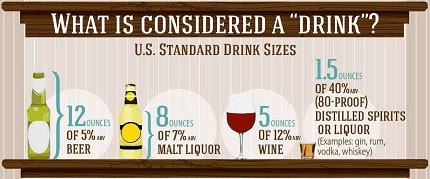Alcohol Can Be Transferred to a Baby Through Motherã¢â‚¬â„¢s Milk During Breastfeeding.
Booze
Not drinking alcohol is the safest pick for breastfeeding mothers. Still, moderate alcohol consumption (upward to ane drink/day) is not known to be harmful to the infant.
What is "moderate consumption"?
The Dietary Guidelines for Americans defines moderate consumption for women of legal drinking historic period as up to 1 standard drink per day.
What is a "beverage"?
The Dietary Guidelines for Americansexternal icon defines a standard "drink" equally 12 ounces of 5% beer; 8 ounces of 7% malt liquor; five ounces of 12% vino; or 1.five ounces of xl% (80 proof) liquor. All of these drinks contain the aforementioned amount (i.due east., fourteen grams, or 0.half dozen ounces) of pure alcohol. However, many mutual drinks incorporate much more alcohol than this. For example, 12 ounces of ix% beer contains nearly the same amount of alcohol equally two (ane.8) standard drinks. Consuming i of these drinks would be the equivalent of two standard drinks.

Is it safe for mothers to breastfeed their babe if they take consumed alcohol?
Not drinking alcohol is the safest option for breastfeeding mothers. Mostly, moderate booze consumption by a breastfeeding mother (upwards to i standard drink per day) is not known to be harmful to the babe, specially if the mother waits at least ii hours subsequently a unmarried beverage earlier nursing. Withal, exposure to alcohol higher up moderate levels through breast milk could be dissentious to an infant'south development, growth, and sleep patterns. Booze consumption higher up moderate levels may as well impair a mother's judgment and ability to safely care for her child.
Drinking alcoholic beverages is not an indication to terminate breastfeeding; however, consuming more than one drink per day is not recommended.
Tin can booze exist found in chest milk?
Yes. Alcohol levels are usually highest in breast milk thirty-threescore minutes after an alcoholic drinkable is consumed, and tin can be generally detected in chest milk for most 2-3 hours per potable later information technology is consumed. Withal, the length of time alcohol tin be detected in breast milk will increase the more alcohol a mother consumes. For example, alcohol from 1 beverage tin can be detected in breast milk for about two-3 hours, booze from 2 drinks tin be detected for well-nigh 4-five hours, and booze from three drinks tin can be detected for about 6-8 hours, and and so on. However, blood booze levels and the length of time booze can be detected in breast milk after drinking will depend on a number of factors, including the corporeality of booze consumed, how fast the alcohol is consumed, whether it is consumed with food, how much a mother weighs, and how fast alcohol is broken downward in a mother's body.
What outcome does alcohol have on a breastfeeding infant?
Moderate booze consumption past a breastfeeding mother (upward to 1 standard drinkable per day) is not known to be harmful to the infant, particularly if the mother waits at least 2 hours before nursing. However, higher levels of booze consumption can interfere with the milk ejection reflex (letdown) while maternal booze levels are high. Over time, excessive alcohol consumption could lead to shortened breastfeeding elapsing due to decreased milk production. Excessive alcohol consumption while breastfeeding could also affect the infant'due south sleep patterns and early development.
Booze and Caregivers
Caring for an baby while intoxicated is not safe. Drinking booze could impair a caregiver's judgement and his or her ability to safely care for an baby. If a caregiver drinks excessively, he or she should adapt for a sober adult to care for the babe during this time.
Tin can expressing/pumping breast milk later consuming alcohol reduce the alcohol in the mother's milk?
No. The alcohol level in chest milk is substantially the aforementioned as the alcohol level in a mother's bloodstream. Expressing or pumping milk afterwards drinking alcohol, and then discarding it ("pumping and dumping"), does NOT reduce the amount of alcohol nowadays in the mother'southward milk more quickly. As the mother's alcohol blood level falls over time, the level of alcohol in her chest milk volition also decrease. A female parent may cull to limited or pump milk after consuming alcohol to ease her physical discomfort or attach to her milk expression schedule. If a mother decides to express or pump milk within two hours (per potable) of consuming alcohol, the female parent may cull to discard the expressed milk. If a female parent has consumed more than than a moderate amount of alcohol, she may choose to wait 2 hours (per drink) to breastfeed her child, or feed her infant with milk that had been previously expressed when she had not been drinking, to reduce her infant's exposure to alcohol. Chest milk continues to contain booze as long as alcohol is yet in the mother'southward bloodstream.
Source: https://www.cdc.gov/breastfeeding/breastfeeding-special-circumstances/vaccinations-medications-drugs/alcohol.html
0 Response to "Alcohol Can Be Transferred to a Baby Through Motherã¢â‚¬â„¢s Milk During Breastfeeding."
Postar um comentário